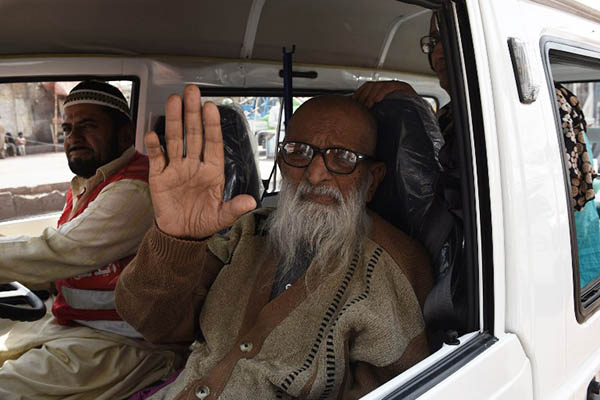
Asif Hassan—AFP
Doctors declared renowned humanitarian in critical condition earlier on Friday.
Celebrated humanitarian and Edhi Foundation Chairman Abdul Sattar Edhi died at 88 in Karachi on Friday night.
Edhi was diagnosed with kidney failure in 2013 but had been unable to receive a transplant due to frail health. He was being treated at the Sindh Institute of Urology and Transplantation and had been in increasingly poor health in recent months—being admitted to hospital for a short period just last month.
A statement issued by the Prime Minister’s Office announced a “one day period of national mourning” for Edhi with flags flying at half-mast. It also accorded a second posthumous Nishan-e-Imtiaz for Edhi and announced that he would receive a state funeral.
“May Allah give Edhi Sahib the best place in paradise and make his journey to Ahkira [the world hereafter] easy,” Prime Minister Nawaz Sharif said in a separate statement released to media. “He was a real gem and asset for Pakistan. We have lost a great servant of humanity.”
Earlier in the day, the philanthropist’s son Faisal Edhi and wife Bilquis Edhi informed media that doctors had termed his health in critical condition. They said he had experienced difficulty breathing while undergoing a scheduled dialysis. “After which [procedure] the doctors decided to shift him on a ventilator,” they said. Faisal urged the nation to pray for his father’s health and speedy recovery.
Born to a family of traders in India’s Gujarat, Edhi arrived in Pakistan in 1947. The state’s inability to help his family care for his mother—paralyzed after a stroke and suffering from mental health issues—led him toward philanthropy after she died when he was 19. Edhi opened his first clinic in Karachi in 1951, when he was 23 years old, with seed money of Rs. 5,000.
Over the years Edhi and his foundation have created over 300 welfare centers across Pakistan, including maternity wards, morgues, orphanages, shelters and homes for the elderly. The foundation has also rescued over 20,000 abandoned infants, trained over 40,000 nurses and helped over 50,000 orphans. The foundation operates entirely on private donations, allowing it to remain independent and avoid criticisms of partisanship that often plague organizations in Pakistan. The Edhi Foundation also runs one of the world’s largest ambulance services—with over 1,500 vehicles—and has helped in relief operations outside Pakistan as well.
Revered by many as a national hero, Edhi has been awarded the Nishan-e-Imtiaz by the Government of Pakistan—the highest civilian honor in the country—and numerous humanitarian awards globally. Edhi has been nominated several times for the Nobel Peace Prize, and was considered a favorite this year after being nominated by Pakistan’s teenage Nobel laureate Malala Yousafzai.
Edhi lived a stark and humble life, famously owning just two sets of clothes and sleeping in a small room adjoining the office of his charitable foundation. The sparsely equipped room echoed his entire philanthropic attitude toward life. Informing the media of his father’s death, Faisal said Edhi had wanted his organs donated to charity. “Unfortunately, due to this old age, only his eyes can be donated,” he said, adding that the corneas would be transplanted.
“He never established a home for his own children,” his wife Bilquis, who manages the foundation’s homes for women and children, told AFP in an interview earlier this year. Edhi was respected by all segments of society. After security services warned of a security threat from the Taliban, the militants issued a statement saying they respected Edhi and would never attack him. Discussing his retirement in the same AFP interview, Edhi said: “I have done a lot of work. I am satisfied with my life.”
